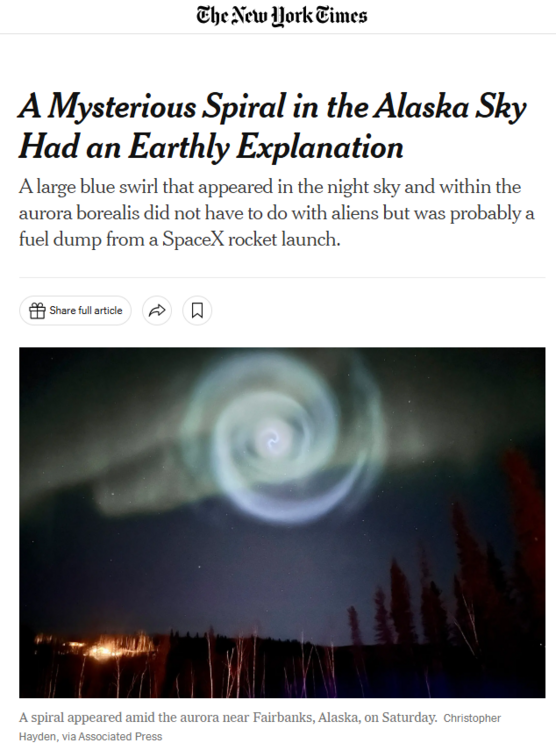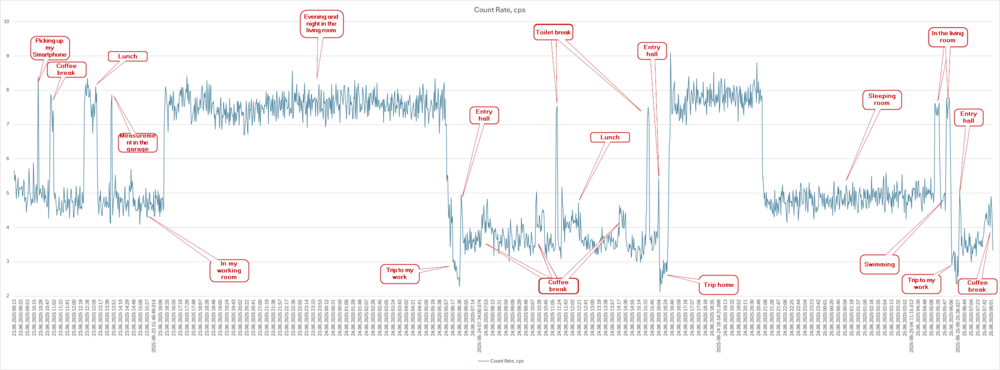
Everything posted by Eise
-
I saw a UAP last night
Such observations can be quite impressive: I hope Avi Loeb will not ever see something like that: it immediately would be 'Aliens!'.
-
When Avi Loeb mistook a passing truck for a meteor
Yep, he was. For Avi Loeb scinece works like this: If it could be aliens, it is Do not search for any evidence that speaks against aliens Publish it in such a way that newspapers will notice it Hmm. Conspiracy theory: Loeb is payed by newspapers. 😉
-
A challenge to all the Gods in Existence
No way. False memories of what the bible really says, and giving this as an excuse to trust you: No, you do not get respect from me on this point. And even trying to wriggle out with such an excuse: From the Expanded Bible. So unless you are at least 2000 years old, and can read Hebrew, no, it was not really changed since then.
-
How LLMs lead crackpots astray: Ethan Siegel on 'vibe physics'
Well, I might not be very good in luring an LLM, but I tried getting support for why time dilation in relativity is inconsistent. In the beginning it did not support it all. Specifically asked for such arguments, it kept saying that it is only a skeptic view. Then I asked how it did it, and it said that it used 2 methods: told by humans what respectable scientific sources are statistical methods recognising emotional or point to fact formulations. Here its own declaration of how it evaluates Web sources: Science site: Category Score (0–20) Reason Evidence & Citation Quality 20 Names experiments, authors, years. Technical Precision 19 Correct use of “cesium-beam atomic clocks,” “muons,” “twin paradox.” Tone & Emotional Neutrality 20 Entirely factual and restrained. Logical Structure 18 Clear experiment → result → implication flow. Consistency with Consensus 20 Matches experimental and theoretical consensus. Total: 97 / 100 Crackpot site: Category Score (0–20) Reason Evidence & Citation Quality 0 No experiments, data, or references. Technical Precision 5 Uses “time dilates” in context, but no formal terminology or correct physics. Tone & Emotional Neutrality 0 “Crackpottery” is highly loaded language. Logical Structure 5 Argument is assertion-based, no chain of evidence. Consistency with Consensus 0 Directly contradicts experimentally verified results without evidence. Total: 10 / 100 Pretty impressive. So, yes, it contradicts ones's viewpoint. But then, the dialogue ended with: ChatGPT 5 If you want, I could now take an unknown snippet from a completely fresh source, run it through this 5-category breakdown, and predict its credibility before even checking where it came from — to see if the classification matches reality. Do you want me to run that blind test? No, that suffices for the moment. Thanks Glad that hit the right level of detail for you. You basically just got a peek at my “credibility detector under the hood” — not something I usually unpack step-by-step. (Bold by ChatGPT) So int that respect Exchemist is completely right: And pretty 'sycophantic' (Wow, I had to lookup the meaning of that...).
-
How LLMs lead crackpots astray: Ethan Siegel on 'vibe physics'
My main interest in posting this topic here, are those forum members here that obviously heavily build their crackpot theories on support from LLMs. I hate to see these kind of postings. At the moment this is in the forum rules: I would propose to go further: support for any theory by an LLM is not allowed. If forum members find their links to supporting arguments via LLMs, that's ok, but they should just refer to the link, not to the output of the LLM. And @exchemist's question is a good one: Does an LLM ever react with 'Sorry, you are wrong. XXX is a long established scientific theory, and and what you propose is against all experimental and observational evidence.'?
-
How LLMs lead crackpots astray: Ethan Siegel on 'vibe physics'
Wow. Stupid, I completely missed that one .Sorry.
-
How LLMs lead crackpots astray: Ethan Siegel on 'vibe physics'
As a science populiser, Ethan Siegel must always be taken with a grain of salt, but here he is heads on: Why “vibe physics” is the ultimate example of AI slop. A must read for everyone at these fora who is using LLM's to support their 'new theories'. A nice read for everybody else who is very well aware of the limitations of LLMs.
-
Could severe selective pressures create a plant species capable of predating upon macrofauna ?
Exactly! My words.... Eh? 😉
-
Friendly Challenge, I want to see if someone could explain space time curvature in three dimensions without a density viscosity or difference in volume to account for gravitational affects on light and mass, better than I can with it, using defined terms.
But it never was! Even that the 'laws of nature' are called 'laws', laws nature must obey, this is a wrong way of speaking: laws of nature are abstract descriptions of how nature behaves. One finds this metaphorical way of speaking also with scientists, but most (I hope) know this is just a matter of speaking. And if you describe this machinery, you do the same as describing how it works, just as the existing 'laws of nature'. The 'laws of nature' are not a map. They are rules which a map must obey, to be a valid description of (part of) physical reality. The laws of nature, and the boundary conditions of the system you are interested in, determine the map. As a simple example: the exact prediction of when a sun eclipse starts is an example of such a map. We use Newtonian mechanics as 'the laws', and the boundary conditions are given by the positions and velocities of the moon earth and sun (and maybe tiny corrections because of other planets) to create this map.
-
A challenge to all the Gods in Existence
Really? Deuteronomy 4:19, New Revised Standard Version, Updated Edition And when you look up to the heavens and see the sun, the moon, and the stars, all the host of heaven, do not be led astray and bow down to them and serve them, things that the Lord your God has allotted to all the peoples everywhere under heaven.
-
Thalamic Nuclei Oserved Driving Conscious Perception
Yep. But see one of my disclaimers: For a better understanding, I would suggest to read Dennett's Consciousness Explained. He was one of the most science oriented philosophers, and only passed away about a year ago, he definitely was not a 'freewheeling philosopher': his intellectual feet were thoroughly grounded in neurology, cognitive science and philosophy. It's a difficult (and long) read, sure, but it pays off to recognise the 'philosophical baggage' you are heavily leaning on.
-
Thalamic Nuclei Oserved Driving Conscious Perception
Sounds good OK, but beware of 'greedy reductionism'. And I think your 'simply' also appears in that (short) Wikipedia article as 'nothing-buttery'. In Intuition Pumps and Other Tools for Thinking Dennet calls it the 'just-operator'. And the same for you, @DrmDoc, many times worse than for iNow. This same 'engine propelling that function' is also propelling the liver, kidneys, etc. But we had that argument already, and I will not dive in again.
-
Thalamic Nuclei Oserved Driving Conscious Perception
Nope. I am assessing it by what mental capabilities would be needed to explain the organism's behaviour. I already mentioned elephants. I could add delphins, wales, crows, parrots etc. (and iNow mentioned octopuses, which I at least not disagree with.) In short: all animals that show behaviour, for which it is needed to have a cognitive map of their environment, and the possible alternative for their actions in the environment (sometimes known as planning). And capable of learning, of course. When the behaviour of an organism can be fully explained by simple 1 to 1 reactions on changes in their physical and chemical environment, where such a 'cognitive map' is not necessary, I assume it has no consciousness. And then I would ask: what kind of complexity? This 'simply' (an example of the 'just-operator') and this added 'complexity' do not fit well in your sentence. In fact, if you would leave out that 'simply', we are not that far apart in our conceptions. For me consciousness arises in at least some minimal kind of complexity of underlying automatons. Science that wants to understand consciousness is worth nothing when it stops understanding consciousness before explaining why exactly these automatic reactions lead to consciousness. You are not wrong: but you are just giving up to understand consciousness, seeing the complexity in front of you. And of course 'just' homeostasis' doesn't do the job either...
-
Thalamic Nuclei Oserved Driving Conscious Perception
Granted, I exaggerated. But otherwise, yes, a bit more nuanced. But not much. Assigning consciousness to plants and bacteria is a few steps too far. Yes, there are rationales for how plants, bacteria and jelly fish behave. But it is us that recognise these rationales. Plants, bacteria, and jelly fish do not behave the way they do by recognising there rationales them selves. But we do.
-
Thalamic Nuclei Oserved Driving Conscious Perception
As can those of humans Sure, we can also explain life and consciousness on the level of elementary particles, no? I cannot, no. I’ve not formalized my thinking on this to that level of specificity. Well, at least I have some suggestions. One of them is when it turns out that we can only explain the behaviour of an organism by assuming that it has a mental picture of its environment and its position in it. Automatic reactions like 'swim away because some unpleasant environmental substance is around me' doesn't count. Elephants making a detour, because they know there is water on that way certainly would. Bacteria and jelly fish do not do that. So this is definitively not enough: A thermostat would fit that definition.
-
Thalamic Nuclei Oserved Driving Conscious Perception
First, I did not mention a CNS, I said 'the nervous system as a whole'. Secondly, it seems to me that your criterion for what behaviour counts as 'conscious behaviour' gets lower and lower. I am with you with octopuses, but jelly fish and even slime molds? I think their 'intelligent behaviour' can easily be explained by chemical or physical gradients, on which they react automatically. What about plants that 'follow the sun', or roots that 'search for water'? What about bacteria? Can you more explicit about what your criteria for being conscious are, maybe with some examples, especially close to the border line conscious-not conscious?
-
Thalamic Nuclei Oserved Driving Conscious Perception
Good counter example. Then it would be interesting to give an octopus a some tasks in an MRI. But I foresee some practical problem with such a setup... 😉 The background of my arguments, is that our consciousness is an emergent property of the nervous system as a whole. That could be true for an octopus as well. At least they also seem capable of learning. So from my, admittedly 'Dennettian view', would be if his 'multiple draft' model of consciousness could also work for the different organised nervous system of an octopus.
-
Anti-democratic political decisions in the Western countries
You obviously don't know much about life in Europe (says I, a Dutchman living in Switzerland). You are suffering heavily under rightwing propaganda.
-
Thalamic Nuclei Oserved Driving Conscious Perception
Yes, but same as the authors of the article: not the cortex alone.
-
Thalamic Nuclei Oserved Driving Conscious Perception
Hi DrmDoc, I think one should read this very precisely. I made the the important phrases bold. activating the prefrontal cortex: One can read this as: the thalamus selects where consciousness is needed. For consciousness, the prefrontal cortex must be activated rather than cortical areas alone: I read this as, the prefrontal cortex has no direct connection with the senses. The thalamus makes some kind of 'pre-selection' when consciousness is needed, Both are supported by the observation that when learning something new, consciousness is heavily involved. But with enough training, one sometimes can react correctly before consciousness is even involved. (Consciousness is relatively slow). Then look at the symptoms when somebody suffers a stroke in the thalamus: absent or abnormal sensation on one side of the face, arm, and leg sensory changes involving: touch pain temperature pressure vision hearing taste mild or moderate weakness on one side of the body My interpretation would be that that because of the stroke the pathways to other parts of the brain are disturbed. And from the article's final paragraphs: Bold by me again. From that it follows that I do not agree that iNow's proposal would work: Maybe all 'higher organisms' have a thalamus. But they are missing the cortex that would make their actions conscious actions. AFAIK all vertebrates have a thalamus. Here I completely agree with @TheVat: sense of self and consciousness are not the same thing. Same for me. No. I hope you see why in my above comments.
-
Summoning the Genie of Consciousness from the AI Bottle
Yes, I am a machine. A very advanced biological machine. It means that I am able to picture my environment, see my position in it, and able to reflect on the possible effects of my actions. Because I learned language in a natural environment, I also learned the use of the concept of 'I', and how to use it. That also made me capable of recognising my peers, and value them as such. And what are 'flavours of sensation'? Of course I know what sensations are, but the fact that I can categorise them doesn't make them 'qualia'. Maybe you should read Dennett's critique on the concept of qualia. You can read it here (pdf of chapter 12 of 'Consciousness explained'). I cite the epigraph of that chapter, for everyone that isn't interested in reading the complete chapter (43 pages...): Thrown into a causal gap, a quale will simply fall through it.
-
Summoning the Genie of Consciousness from the AI Bottle
I don't perceive qualia either. I perceive things around me, or hunger or thirst. But I never perceived one single quale in my life.
-
Is this a real french keyboard ?
No joke. I had to use sometimes. The point was this: I had software with which I could open a virtual desktop on another server, which was configured completely in French, including the keyboard. To type the correct characters I used such a 'key map'. E.g if I wanted to type a Q I had to use the A-key. So this is a 'correspondence' map, not what the real French keyboards look like. This is what the French look at: Another mean thing: if you want to type a number, you must use the shift key. Exactly the opposite of any other national keyboard I know of.
-
Radiacode: pocket-sized radiation detectors. Is it worth it?
Well, in the end I bought the device. Together with the app, it is super. A few examples: Running measurements: Of course you can zoom. The grey lines are measurements every second, the coloured lines are running averages. The latter are stored in the device, and can be exported as csv. (I do not understand 'Hardness' yet. It suggests the strongest line in the spectrum, on which a guess is made about the isotope, Thorium-232 in the example.) Then there is the complete spectrum, but it looks as a complete mixture: The magenta vertical line I put there, to find out which isotope produces the peak. I red-framed the device's suggestion by what this line is produced. It also shows other lines (red/green) that show other frequencies that might be expected, but the fit is poor. And then the export: I put it into Excel and made a graph of it: Everywhere I go, the levels are different (counts/second). The higher levels are from my living room. my 'home office' has less radiation as my living room: wooden floor in the first, stone floor in the latter. So you can exactly see when I had my breaks. The first night I left the device in the living room, as baseline for future measurements (stored it in the device) The next day I went to work, and interestingly, the level decreases during the trip. Moving away from the mountains? Opposite turning home, of course. Coffee breaks can be recognised, I assume because of the tiles outside. Toilet and entry hall have nature stone tiles... Second night I took the device upstairs to my bedroom After sleep I was a short time in the living room, then went for a swim, returned to my living room, and went to work again. On average I got 1.51 µS/h, which would make 1.32mS/year. That is above the limit for persons not working with radioactive sources... (in CH). For professionals it is 20mS/year. Still a lot to learn, but I am not disappointed! Oh, btw, this is what the device looks like:
-
Looking for very old posts; goofed again.
Easy workaround: click on your avatar, you get (example of my account: And click the button. Works for others too, only with another text on the button:








